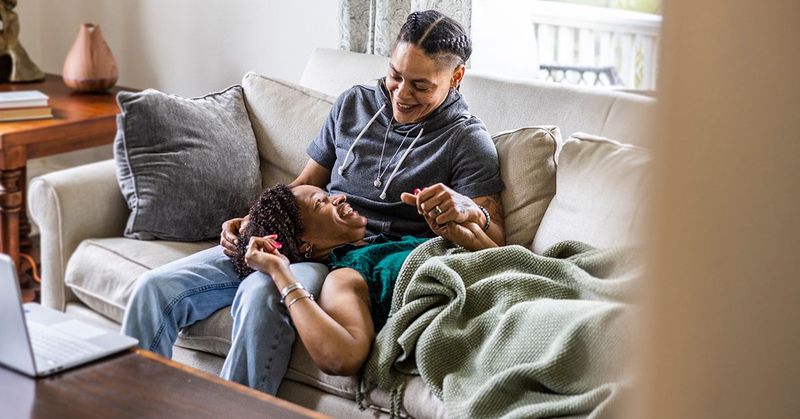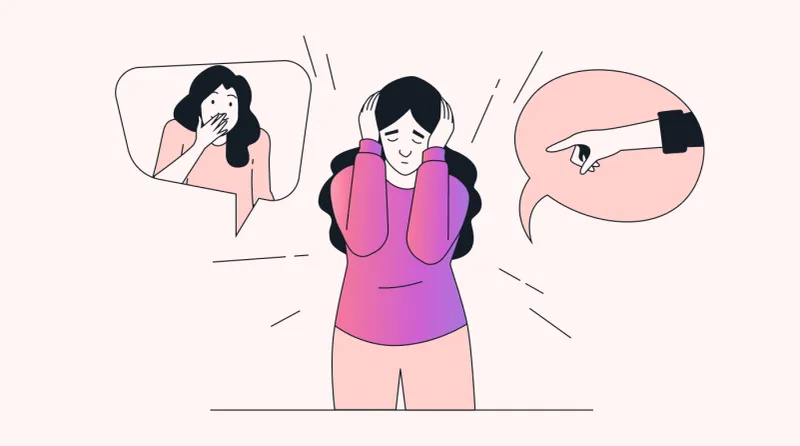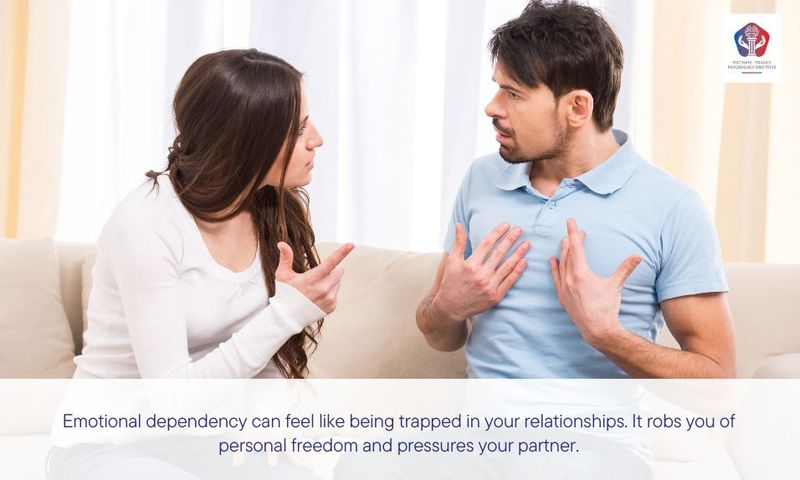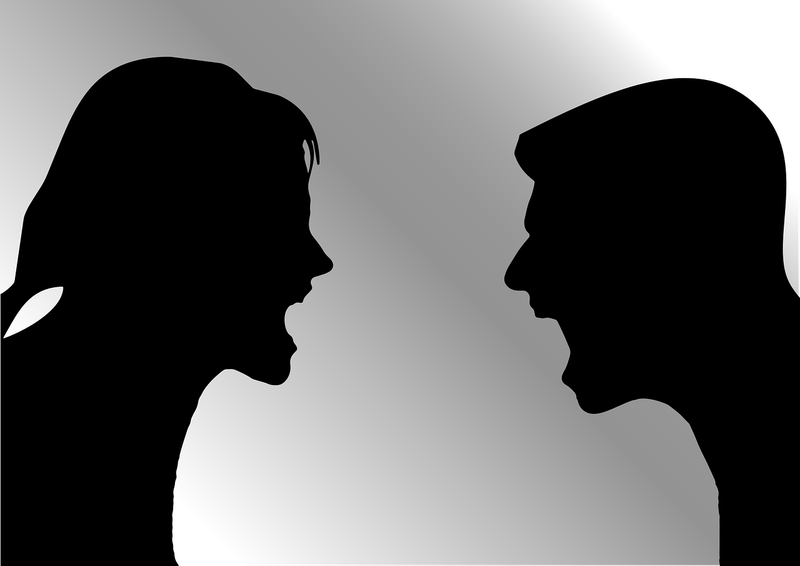Because needing love is normal — but relying on someone else to regulate your emotions? That’s a red flag. Let’s be honest: emotional dependence can sneak into relationships without either person noticing.
One minute you’re sharing memes and inside jokes, the next, you’re questioning if it’s love or just fear of being alone. We all want to feel needed, but there’s a big difference between sharing your life with someone and expecting them to carry your entire emotional backpack.
When your partner’s happiness feels like it’s always in your hands, things get heavy fast. Emotional connection is healthy; emotional dependence is a whole other ballgame. If you’ve ever wondered where the line is, here’s how to spot when your partner’s love leans a little too hard.
1. The Bottomless Pit of Reassurance
Ever feel like you could write a novel with all the ways you reassure your partner? Some people can never get enough proof you care. Even after the millionth “I love you,” their anxiety doesn’t budge.
You’re left scrambling for new ways to say the same thing, hoping this time it’ll stick. If your texts, hugs, and compliments feel like throwing water at a bottomless well, you might be dealing with someone who can’t hold onto reassurance for more than a minute. It’s exhausting.
The catch? It’s not about you or how deeply you love. Their neediness comes from their own doubts. You could shout your devotion from the rooftops, and they’d still crave more. This kind of insecurity makes relationships feel like performance reviews instead of partnerships.
2. Alone Time? Cue the Meltdown
Imagine asking for an evening to yourself and your partner’s face drops like you’ve just canceled their birthday party. It’s not that you don’t love each other—it’s just, everyone needs space. But when they sulk, panic, or act wounded because you want a night in, you end up feeling guilty for even wanting time alone.
That’s when things get tricky. Needing space is self-care, not rejection, but emotional dependence flips the script. Suddenly, your simple boundary turns into a grand betrayal in their mind.
If you start dreading alone time because of the drama it causes, that’s a sign things aren’t as balanced as they should be. Love should feel like freedom, not a cage with velvet bars.
3. Mood Swings: Powered by You
Ever notice how your partner’s mood seems to rise and fall with yours? If you’re stressed or distant, they unravel. It’s like their emotional weather forecast depends entirely on your temperature.
At first, it might seem sweet that they care so much about your feelings. But when their happiness hangs on every little thing you do, it’s a lot to carry. If a bad day at work means they immediately spiral, you’re not partners—you’re their emotional barometer.
Healthy relationships mean supporting each other, not being responsible for someone’s every high and low. When you feel guilty for having normal human emotions, it’s time to ask: who’s actually in charge of their feelings?
4. The Fixer-Upper Fantasy
Ever been cast as someone’s personal therapist? Emotional dependence can turn you into the fixer of every meltdown. They don’t just confide in you—they expect you to fix every bad feeling, every single time.
It’s flattering at first, being their safe space. But suddenly, you’re carrying their stress, sadness, and anxiety, on top of your own. The weight doubles. When your partner expects you to do all the emotional heavy lifting, it’s not love—it’s unpaid labor with no days off.
Soon, you’re exhausted, and they’re never satisfied. Real talk: everyone has to learn to self-soothe. Love means helping, not handling everything for them.
5. Jealousy Over Your Calendar
Canceling plans with friends because your partner can’t handle it? That’s not protective—it’s jealousy dressed up as devotion. They see any attention you give to friends, family, or even hobbies as a threat.
The guilt trips start sneaking in: “You’re always busy when I want to hang out.” Suddenly, you’re the bad guy for having a life outside of them. Emotional dependence loves to turn normal socializing into drama.
Healthy love means cheering each other on, not demanding a starring role in every scene. When every text, laugh, or brunch invite turns into a small turf war, it’s time to check what’s really going on beneath the surface.
6. Texting 24/7—But Not in a Cute Way
At first, constant texting feels adorable—who doesn’t love a flood of cute messages? But if your partner needs non-stop contact just to function, that’s not romance, it’s anxiety in disguise.
You don’t get breaks. If you don’t respond fast enough, the questions start: “Are you mad at me?” “Did I do something wrong?” Silence becomes a crime scene they have to investigate.
It’s not just curiosity—it’s a fear of losing connection, every single minute. A healthy relationship has space for silence and independence. If you’re scared to put your phone down, something’s off.
7. Indecision Central: Can’t Choose Without You
You know that friend who can’t pick a restaurant unless you approve? Living with them is a daily game of 20 Questions. Even tiny choices—what to eat, what to wear—become group projects.
But it’s not just the small stuff. They hesitate over big life decisions until you weigh in. It feels sweet at first, like they trust your judgment. But when it becomes constant, you’re stuck making choices for two.
Independence is sexy. If your partner can’t move an inch without your okay, things get stifling—fast. You need a partner, not a permanent shadow.
8. Taking Your Emotions as a Personal Attack
Ever have a bad day and watch your partner’s smile instantly disappear? When they take your stress as a sign you’re mad at them, it’s exhausting. Suddenly, you’re not allowed to be moody without causing a crisis.
You start editing yourself—hiding your feelings to keep the peace. But that’s not fair to either of you. Your emotions belong to you, not them.
If every time you’re off, they spiral or get defensive, that’s a sign of emotional dependence. In real love, partners support each other—but don’t make every feeling about themselves.
9. Boundaries = Betrayal?
Setting boundaries is self-respect, not rejection. But with an emotionally dependent partner, even asking for a tiny bit of space feels like tearing their world apart. You say you need quiet time, and suddenly you’re the villain in their story.
They might say, “Why are you shutting me out?” or, “You used to love talking to me.” Guilt becomes their secret weapon. Suddenly, you’re questioning if you’re asking for too much.
Here’s the truth: boundaries make relationships healthier, not colder. Anyone who turns your self-care into a crime scene probably needs to look in the mirror, not at you.
10. Relationship Status = Self-Worth
Some people measure their self-worth by the status of their relationship. If things are perfect, they’re on cloud nine. But if there’s a bump in the road, their confidence crashes.
It’s a rollercoaster for both of you. You feel like you have to keep the relationship drama-free just so they can feel good about themselves. That’s a lot of pressure.
Self-esteem should come from within, not from how smoothly your relationship is running. When their sense of value rises and falls with your moods, it’s a sign of emotional dependence—not genuine connection or love.
11. Lost in Your Shadow
Ever feel like your partner’s entire world revolves around you? Their interests, goals, and even their self-image get lost in the shuffle. It’s like their personality is on pause until you give them direction.
At first, it might seem flattering that someone wants to share everything. But eventually, it gets lonely playing the lead in someone else’s life story.
A healthy relationship means two whole people. If your partner can’t answer, “Who are you without me?” that’s a big clue that their identity is tangled up in emotional dependence.
12. Drop Everything—It’s My Crisis Now
Plans, deadlines, or even your much-needed nap—none of it matters when your partner’s having a meltdown. They expect you to hit pause on your life the second they feel upset. Their crisis becomes the center of your universe.
Sure, supporting your partner is what love’s about. But if you’re always dropping your responsibilities to manage their emotions, something’s off.
Life isn’t all about one person’s needs. If your boundaries or commitments get bulldozed every time they’re upset, that’s not partnership. It’s emotional hijacking—one word: exhausting.
13. The End-of-the-World Feeling Over Distance
Does every argument feel like it’s the end of everything? Emotional dependence makes even the smallest disagreements feel like catastrophic events. Your partner might panic, get angry, or completely shut down.
Normal distance—like needing a little space—sends them into survival mode. Your boundaries don’t just hurt their feelings; they rock their whole world. Suddenly, you’re managing their panic instead of fixing the actual issue.
Partners can disagree without falling apart. If every conflict feels like a five-alarm fire, emotional dependency may be calling the shots.
14. Mirror, Mirror: Copycat Syndrome
Ever catch your partner copying your favorite phrases or suddenly loving your music? At first, it’s cute. But when their quirks, habits, and opinions start to look suspiciously like yours, it’s less about connection—and more about fear of being left out.
It’s not always conscious. They might genuinely want to fit in. But when your partner mirrors you so much they lose sight of what makes them unique, things start to feel a little creepy.
Real partnership means celebrating differences, not morphing into a clone. If you’re dating your own reflection, it’s time to talk.
15. On a Pedestal—Until You Fall Off
Being adored feels amazing—until it doesn’t. Some emotionally dependent partners put you so high on a pedestal, the pressure is unreal. One mistake or human moment, and their disappointment is intense.
At first, you’re the hero in their story. Then, when you show flaws or have bad days, they act like you’ve shattered their dreams. It’s a cycle of idealization and deep letdown.
Real love is messy and human. If you can’t let your guard down without breaking their heart, you’re not being loved—you’re being worshipped, and that’s not real or sustainable.
16. Stress? Time to Cling
When life gets tough, does your partner rush to you instead of handling it themselves? Emotional dependence loves to turn you into their emotional life raft. They need your steady presence just to keep it together.
It’s sweet to be needed, but if you’re always the first (and only) call, it gets draining. You end up stuffing your own stress away just to handle theirs.
Healthy adults figure out ways to cope—with or without a partner. If you’re their only coping mechanism, you’ll burn out before they ever learn to stand on their own feet.
17. Mistaking Drama for Love
Ever notice how some couples are all about the highs and lows? If your partner craves emotional intensity—fights, makeup sessions, big declarations—they might be confusing drama with real intimacy.
Every interaction feels like the season finale of a reality show. But real connection isn’t about constant adrenaline. Love doesn’t need chaos to feel alive.
If you find yourself exhausted (or low-key dreading the next emotional rollercoaster), it’s a sign the relationship is running on anxiety, not affection. Calm can feel weird at first, but it’s what real love actually needs.


















